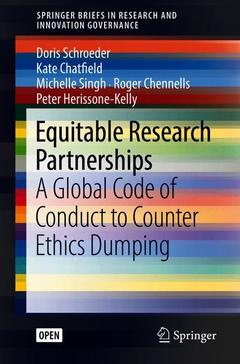Equitable Research Partnerships, 1st ed. 2019 A Global Code of Conduct to Counter Ethics Dumping SpringerBriefs in Research and Innovation Governance Series
Auteurs : Schroeder Doris, Chatfield Kate, Singh Michelle, Chennells Roger, Herissone-Kelly Peter

This open access book offers insights into the development of the ground-breaking Global Code of Conduct for Research in Resource-Poor Settings (GCC) and the San Code of Research Ethics. Using a new, intuitive moral framework predicated on fairness, respect, care and honesty, both codes target ethics dumping ? the export of unethical research practices from a high-income setting to a lower- or middle-income setting. The book is a rich resource of information and argument for any research stakeholder who opposes double standards in research. It will be indispensable for applicants to European Union framework programmes, as the GCC is now a mandatory reference document for EU funding.
Foreword.- Acknowledgements.- Chapter 1. Ethics Dumping and the Need for a Global Code of Conduct.- Chapter 2. A Value-Based Global Code of Conduct to Counter Ethics Dumping.- Chapter 3. The Four Values Framework: Fairness, Respect, Care and Honesty.- Chapter 4. Respect and a Global Code of Conduct?.- Chapter 5. Exploitation Risks in Collaborative International Research.- Chapter 6. How the Global Code of Conduct Was Built.- Chapter 7. The San Code of Research Ethics.- Chapter 8. Good Practice to Counter Ethics Dumping.- Chapter 9. Towards Equitable Research Partnership.- Appendix.
Kate Chatfield is deputy director of the Centre for Professional Ethics, University of Central Lancashire, UK. She is a social science researcher and ethicist specializing in global justice, research ethics, animal ethics and responsible innovation.
Roger Chennells works as legal adviser to the South African San Institute (SASI) and is a founder-partner in the human rights law practice Chennells Albertyn, Stellenbosch, established in 1981. Specializing in labour, land, environmental and human rights law, he has also worked for Aboriginal people in Australia.
Peter Herissone-Kelly is senior lecturer in philosophy, University of Central Lancashire, UK. He is a specialist in Kantian ethics as well as bioethics, analytic philosophy of language and metaethics.
Doris Schroeder is director of the Centre for Professional Ethics at the University of Central Lancashire, and professor of moral philosophy at the School of Law, UCLan Cyprus.She is the lead author of the Global Code of Conduct for Research in Resource-Poor Settings.
Michelle Singh is a project officer at the European & Developing Countries Clinical Trials Partnership (EDCTP) in Cape Town, South Africa. She holds a medical PhD and previously managed maternal and child health research studies and clinical trials at the South African Medical Research Council.
Date de parution : 06-2019
Ouvrage de 122 p.
15.5x23.5 cm



